Unit 2 Morals and Virtues-Period 3 Discovering Useful Structures课件(共26张PPT)
文档属性
| 名称 | Unit 2 Morals and Virtues-Period 3 Discovering Useful Structures课件(共26张PPT) | 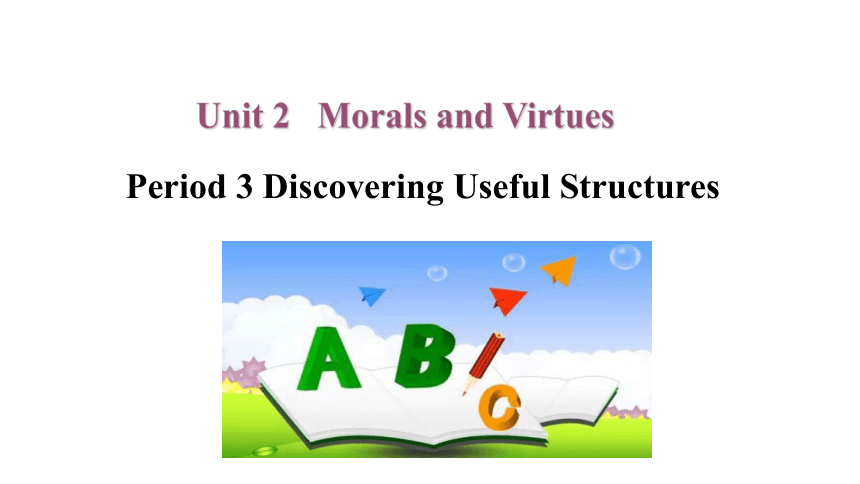 | |
| 格式 | ppt | ||
| 文件大小 | 1.3MB | ||
| 资源类型 | 教案 | ||
| 版本资源 | 人教版(2019) | ||
| 科目 | 英语 | ||
| 更新时间 | 2024-11-14 20:34:40 | ||
图片预览


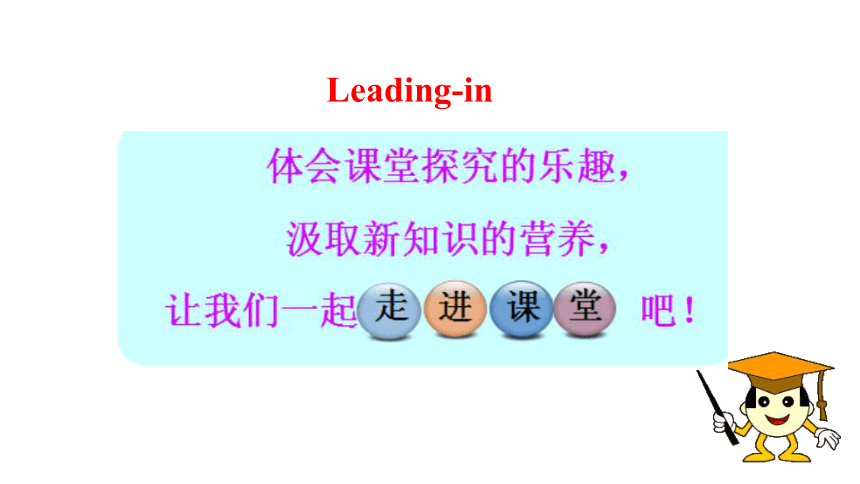
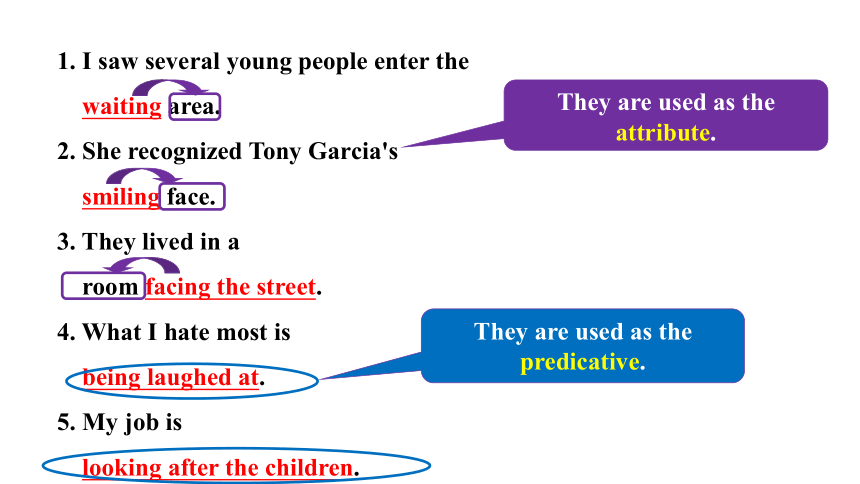
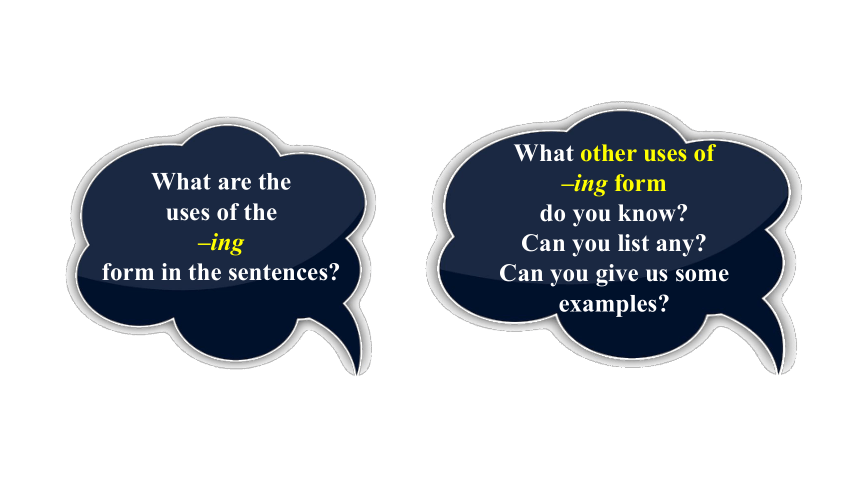

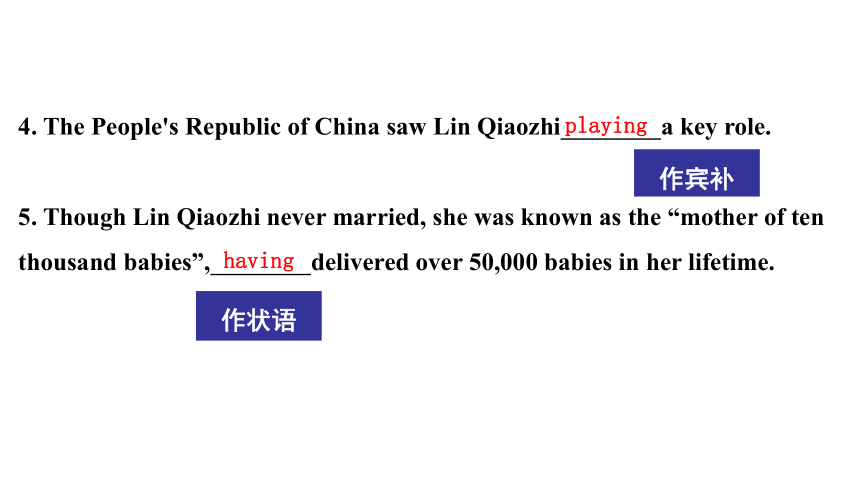
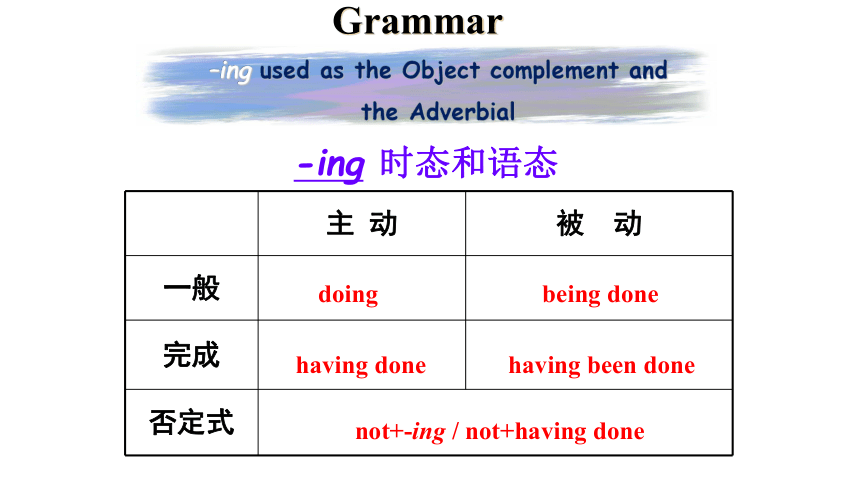
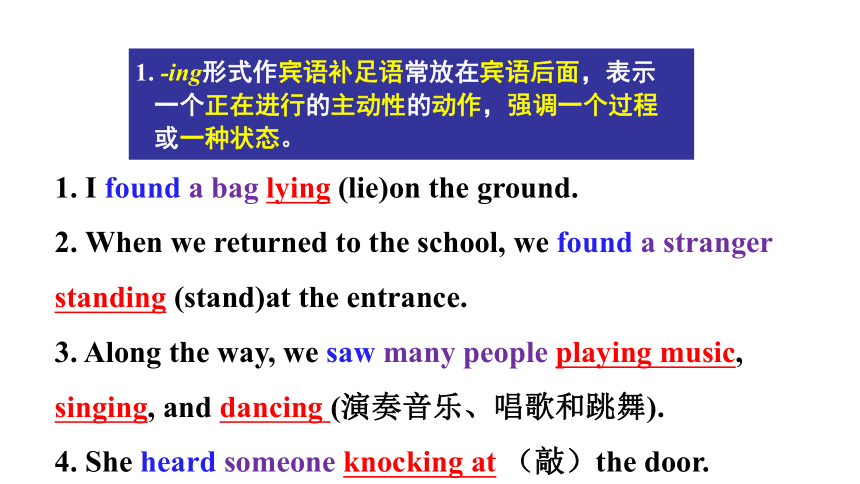
文档简介
(共26张PPT)
Period 3 Discovering Useful Structures
Unit 2 Morals and Virtues
1. To learn about the –ing used as the Object complement and the Adverbial.
2. To use phrases properly.
Learning aims
Leading-in
1. I saw several young people enter the
waiting area.
2. She recognized Tony Garcia's
smiling face.
3. They lived in a
room facing the street.
4. What I hate most is
being laughed at.
5. My job is
looking after the children.
They are used as the attribute.
They are used as the predicative.
What are the
uses of the
–ing
form in the sentences
What other uses of
–ing form
do you know
Can you list any
Can you give us some examples
Have a
Observe the following sentences and pay attention to the red parts.
1. “Why should girls learn so much Finding a good husband should be their final goal!” her brother complained, of the high tuition fee.
2. of all the people still in need of help, Dr Lin opened a private clinic.
3. At times she was even seen a donkey to faraway villages to provide medical care.
作状语
作状语
作宾补
thinking
Thinking
riding
4. The People's Republic of China saw Lin Qiaozhi a key role.
5. Though Lin Qiaozhi never married, she was known as the “mother of ten thousand babies”, delivered over 50,000 babies in her lifetime.
作宾补
作状语
playing
having
-ing 时态和语态
主 动 被 动
一般
完成
否定式
doing
being done
having done
having been done
not+-ing / not+having done
–ing used as the Object complement and
the Adverbial
Grammar
1. I found a bag lying (lie)on the ground.
2. When we returned to the school, we found a stranger standing (stand)at the entrance.
3. Along the way, we saw many people playing music,
singing, and dancing (演奏音乐、唱歌和跳舞).
4. She heard someone knocking at (敲)the door.
1. -ing形式作宾语补足语常放在宾语后面,表示
一个正在进行的主动性的动作,强调一个过程
或一种状态。
1. They found a dog sleeping on the street.
2. Some one heard him singing in the next room.
3. We mustn't keep them waiting.
2. 当主句转换为被动结构时,原来作宾语补足语的-ing形式便转换为主语补足语。
= The dog is found sleeping on the street.
他们发现一只狗在街上睡觉。
= He was heard singing in the next room.
有人听到他在隔壁房间唱歌。
= They mustn't be kept waiting.
我们千万不能让他们等。
3. 能用-ing形式作宾语补足语的几类动词:
1. We saw a light (burn)in the window.
2. I felt somebody (pat) me on the shoulder.
3. Can you smell anything (burn)
4. As he spoke, he observed everybody (look at) him curiously.
5. Listen to the birds (sing).
6.(2022·全国乙卷)Rosamond and Dorothy would arrive at the schoolhouse to find the children (weep)from the cold.
① 表示感觉和心理状态的动词短语,常见的有see, hear, feel, smell, find, notice, observe, look at, listen to等。
burning
patting
burning
looking at
singing
weeping
1. I won’t have you (do)that.
2. This set me (think).
3. I’m sorry to have kept you (wait).
4. I can’t get the clock (go) again.
5. You won’t catch me (do) that again.
6. He walked off and left me (sit) there alone.
② 表示指使意义的动词,常见的有
have, set, keep, get, catch, leave等。
doing
thinking
waiting
going
doing
sitting
4. see, hear, feel, watch等动词之后用-ing形式和动
词不定式作宾语补足语的区别:
1. We passed by the classroom and saw the teacher making the experiment.
2. We sat an hour and watched the teacher make the experiment.
我们走过教室,看见老师在做实验。
我们坐了一个小时,看老师做实验。
(只在走过教室的刹那间,看见老师正在做实验)
(一个小时之内一直在看老师做实验)
表示动作正在进行
表示(或强调)动作从开始到结束的全过程
1. I saw them _______ (force) the door open with a hammer.
2. We heard them __________ (quarrel) about money after the concert; they looked very angry.
3. I heard him ________ (drop) lots of coins into the collecting tin.
4. The students who are caught ________(cheat) in the exam will be punished.
5. Don't leave her ________(wait) outside in the rain.
forcing
quarreling
dropping
Fill in the blanks.
cheating
【即学即练】
waiting
1. Walking in the street, I saw a tailor's shop.
2. Being poor, he couldn't afford a TV set.
3. His father died, leaving the family even worse off.
时间
原因
结果
1. When I walked in the street, I saw a tailor’s shop.
2. Because he was poor, he couldn’t afford a TV set.
3. His father died and left the family even worse off.
4. Using your head, you will find a good way.
5. Studying hard, he didn't pass the exam.
6. He earns a living driving a truck.
7. He sat in the chair reading a newspaper.
条件
让步
方式
伴随
5. Though he studied hard, he didn’t pass the exam.
7. He sat in the chair and read a newspaper.
6. He earns a living by driving a truck.
4. If you use your head, you will find a good way.
-ing形式作状语时,它的逻辑主语必须与主句的主语是一致的。
Check the sentences.
Looking out of the window, a cat was walking along the wall.
Looking out of the window, we saw a cat walking along the wall.
1. Supposing it rains, we will put off the sports meeting.
2. Generally speaking, boys are more interested in science than girls.
如果下雨,我们就推迟运动会。
一般来说,男孩比女孩对科学更感兴趣。
V–ing 用于某些固定搭配中,
表示说话人的态度、观点等,如:generally speaking, frankly/honestly speaking, judging by/from, considering/seeing, supposing 等
1. ____________ (not know) his address, I couldn't go to see him yesterday.
2. They are visitors _______ (come) from several countries.
3. _____________________ (not invite) to the party, Mary was greatly hurt.
4. He dived into the water, _______ (leave) only his face exposed(暴露).
5. _______ (take) a deep breath, they dived into the water.
Not knowing
coming
Not having been invited
Fill in the blanks.
leaving
Taking
【即学即练】
Read the following story and rewrite the underlined parts using the -ing form.
1. … he became very interested in medicine, to become a doctor.
2. … after of many people who were dying in the war.
3. to organise hospitals, he taught doctors and nurses, and showed people how to give first aid.
/He helped to organise hospitals, doctors and nurses, and people how to give first aid.
4. … Dr Bethune as a hero to be remembered in China.
deciding
hearing
Helping
teaching
showing
praising
-ing作宾补和状语
构成
一般:
doing;being done
完成:
having done;
having been done
否定:not+-ing / not+having done
1. -ing形式作宾语补足语常放在宾语后面,表示一个正在进行的主动性的动作,强调一个过程或一种状态。
2. 当主句转换为被动结构时,原来作宾语补足语的-ing形式便转换为主语补足语。
3. 能用-ing形式作宾语补足语的几类动词: ① 表示感觉和心理状态的动词(短语),常见的有see, hear, feel, smell, find, notice, observe, look at, listen to等。
② 表示指使意义的动词,常见的有 have, set, keep, get, catch, leave等。
1.-ing形式可以表示时间、原因、结果、条件、让步、方式或伴随状况等,其作用相当于状语从句或并列句。
2.-ing形式作状语时,它的逻辑主语必须与主句的主语是一致的。
3.V–ing 用于某些固定搭配中,表示说话人的态度、观点等,如:generally speaking, frankly/honestly speaking, judging by/from, considering/seeing, supposing 等。
作状语
作宾补
Summary
1. All the football players on the playground cheered loudly, ________
(say) that I had a talent for football.
2. Nervously ______ (face) challenges, I know I will whisper myself the two
simple words “Be yourself”.
3. Around 13,500 new jobs were created during the period, _________
(exceed) the expected number of 12,000 held by market analysts.
4. The hospital has recently obtained new medical equipment, _________
(allow) more patients to be treated.
saying
facing
exceeding
allowing
Exercise
Ⅰ. 语法填空
Ⅱ.选词填空
feel want face smile
return worry hear knock
1. ________ that his wife had been injured in an accident, Mr Johnson
hurried to the hospital.
2. During the operation, she sat in the waiting room for over an hour
________ about him.
3. I saw her whispering something into his ear, obviously not ________ to be
heard.
4. He suddenly woke up at midnight when he heard someone ________ at
his door.
Hearing
worrying
wanting
knocking
feel want face smile
return worry hear knock
5. _______ higher import and export costs, the company is looking for ways to survive.
6. _________ from the North Pole, the traveller wrote a book about his experience and had it published the following year.
7. The child lay on her mother's lap, _______ sweetly.
8. _______ hurt by the rejection, she bit her lip and quietly walked away.
Facing
Returning
smiling
Feeling
The superior man thinks always of virtue; the common man thinks of comfort.
—Confucius
高尚的人总是想到美德;普通人想到舒适。
——孔子
Period 3 Discovering Useful Structures
Unit 2 Morals and Virtues
1. To learn about the –ing used as the Object complement and the Adverbial.
2. To use phrases properly.
Learning aims
Leading-in
1. I saw several young people enter the
waiting area.
2. She recognized Tony Garcia's
smiling face.
3. They lived in a
room facing the street.
4. What I hate most is
being laughed at.
5. My job is
looking after the children.
They are used as the attribute.
They are used as the predicative.
What are the
uses of the
–ing
form in the sentences
What other uses of
–ing form
do you know
Can you list any
Can you give us some examples
Have a
Observe the following sentences and pay attention to the red parts.
1. “Why should girls learn so much Finding a good husband should be their final goal!” her brother complained, of the high tuition fee.
2. of all the people still in need of help, Dr Lin opened a private clinic.
3. At times she was even seen a donkey to faraway villages to provide medical care.
作状语
作状语
作宾补
thinking
Thinking
riding
4. The People's Republic of China saw Lin Qiaozhi a key role.
5. Though Lin Qiaozhi never married, she was known as the “mother of ten thousand babies”, delivered over 50,000 babies in her lifetime.
作宾补
作状语
playing
having
-ing 时态和语态
主 动 被 动
一般
完成
否定式
doing
being done
having done
having been done
not+-ing / not+having done
–ing used as the Object complement and
the Adverbial
Grammar
1. I found a bag lying (lie)on the ground.
2. When we returned to the school, we found a stranger standing (stand)at the entrance.
3. Along the way, we saw many people playing music,
singing, and dancing (演奏音乐、唱歌和跳舞).
4. She heard someone knocking at (敲)the door.
1. -ing形式作宾语补足语常放在宾语后面,表示
一个正在进行的主动性的动作,强调一个过程
或一种状态。
1. They found a dog sleeping on the street.
2. Some one heard him singing in the next room.
3. We mustn't keep them waiting.
2. 当主句转换为被动结构时,原来作宾语补足语的-ing形式便转换为主语补足语。
= The dog is found sleeping on the street.
他们发现一只狗在街上睡觉。
= He was heard singing in the next room.
有人听到他在隔壁房间唱歌。
= They mustn't be kept waiting.
我们千万不能让他们等。
3. 能用-ing形式作宾语补足语的几类动词:
1. We saw a light (burn)in the window.
2. I felt somebody (pat) me on the shoulder.
3. Can you smell anything (burn)
4. As he spoke, he observed everybody (look at) him curiously.
5. Listen to the birds (sing).
6.(2022·全国乙卷)Rosamond and Dorothy would arrive at the schoolhouse to find the children (weep)from the cold.
① 表示感觉和心理状态的动词短语,常见的有see, hear, feel, smell, find, notice, observe, look at, listen to等。
burning
patting
burning
looking at
singing
weeping
1. I won’t have you (do)that.
2. This set me (think).
3. I’m sorry to have kept you (wait).
4. I can’t get the clock (go) again.
5. You won’t catch me (do) that again.
6. He walked off and left me (sit) there alone.
② 表示指使意义的动词,常见的有
have, set, keep, get, catch, leave等。
doing
thinking
waiting
going
doing
sitting
4. see, hear, feel, watch等动词之后用-ing形式和动
词不定式作宾语补足语的区别:
1. We passed by the classroom and saw the teacher making the experiment.
2. We sat an hour and watched the teacher make the experiment.
我们走过教室,看见老师在做实验。
我们坐了一个小时,看老师做实验。
(只在走过教室的刹那间,看见老师正在做实验)
(一个小时之内一直在看老师做实验)
表示动作正在进行
表示(或强调)动作从开始到结束的全过程
1. I saw them _______ (force) the door open with a hammer.
2. We heard them __________ (quarrel) about money after the concert; they looked very angry.
3. I heard him ________ (drop) lots of coins into the collecting tin.
4. The students who are caught ________(cheat) in the exam will be punished.
5. Don't leave her ________(wait) outside in the rain.
forcing
quarreling
dropping
Fill in the blanks.
cheating
【即学即练】
waiting
1. Walking in the street, I saw a tailor's shop.
2. Being poor, he couldn't afford a TV set.
3. His father died, leaving the family even worse off.
时间
原因
结果
1. When I walked in the street, I saw a tailor’s shop.
2. Because he was poor, he couldn’t afford a TV set.
3. His father died and left the family even worse off.
4. Using your head, you will find a good way.
5. Studying hard, he didn't pass the exam.
6. He earns a living driving a truck.
7. He sat in the chair reading a newspaper.
条件
让步
方式
伴随
5. Though he studied hard, he didn’t pass the exam.
7. He sat in the chair and read a newspaper.
6. He earns a living by driving a truck.
4. If you use your head, you will find a good way.
-ing形式作状语时,它的逻辑主语必须与主句的主语是一致的。
Check the sentences.
Looking out of the window, a cat was walking along the wall.
Looking out of the window, we saw a cat walking along the wall.
1. Supposing it rains, we will put off the sports meeting.
2. Generally speaking, boys are more interested in science than girls.
如果下雨,我们就推迟运动会。
一般来说,男孩比女孩对科学更感兴趣。
V–ing 用于某些固定搭配中,
表示说话人的态度、观点等,如:generally speaking, frankly/honestly speaking, judging by/from, considering/seeing, supposing 等
1. ____________ (not know) his address, I couldn't go to see him yesterday.
2. They are visitors _______ (come) from several countries.
3. _____________________ (not invite) to the party, Mary was greatly hurt.
4. He dived into the water, _______ (leave) only his face exposed(暴露).
5. _______ (take) a deep breath, they dived into the water.
Not knowing
coming
Not having been invited
Fill in the blanks.
leaving
Taking
【即学即练】
Read the following story and rewrite the underlined parts using the -ing form.
1. … he became very interested in medicine, to become a doctor.
2. … after of many people who were dying in the war.
3. to organise hospitals, he taught doctors and nurses, and showed people how to give first aid.
/He helped to organise hospitals, doctors and nurses, and people how to give first aid.
4. … Dr Bethune as a hero to be remembered in China.
deciding
hearing
Helping
teaching
showing
praising
-ing作宾补和状语
构成
一般:
doing;being done
完成:
having done;
having been done
否定:not+-ing / not+having done
1. -ing形式作宾语补足语常放在宾语后面,表示一个正在进行的主动性的动作,强调一个过程或一种状态。
2. 当主句转换为被动结构时,原来作宾语补足语的-ing形式便转换为主语补足语。
3. 能用-ing形式作宾语补足语的几类动词: ① 表示感觉和心理状态的动词(短语),常见的有see, hear, feel, smell, find, notice, observe, look at, listen to等。
② 表示指使意义的动词,常见的有 have, set, keep, get, catch, leave等。
1.-ing形式可以表示时间、原因、结果、条件、让步、方式或伴随状况等,其作用相当于状语从句或并列句。
2.-ing形式作状语时,它的逻辑主语必须与主句的主语是一致的。
3.V–ing 用于某些固定搭配中,表示说话人的态度、观点等,如:generally speaking, frankly/honestly speaking, judging by/from, considering/seeing, supposing 等。
作状语
作宾补
Summary
1. All the football players on the playground cheered loudly, ________
(say) that I had a talent for football.
2. Nervously ______ (face) challenges, I know I will whisper myself the two
simple words “Be yourself”.
3. Around 13,500 new jobs were created during the period, _________
(exceed) the expected number of 12,000 held by market analysts.
4. The hospital has recently obtained new medical equipment, _________
(allow) more patients to be treated.
saying
facing
exceeding
allowing
Exercise
Ⅰ. 语法填空
Ⅱ.选词填空
feel want face smile
return worry hear knock
1. ________ that his wife had been injured in an accident, Mr Johnson
hurried to the hospital.
2. During the operation, she sat in the waiting room for over an hour
________ about him.
3. I saw her whispering something into his ear, obviously not ________ to be
heard.
4. He suddenly woke up at midnight when he heard someone ________ at
his door.
Hearing
worrying
wanting
knocking
feel want face smile
return worry hear knock
5. _______ higher import and export costs, the company is looking for ways to survive.
6. _________ from the North Pole, the traveller wrote a book about his experience and had it published the following year.
7. The child lay on her mother's lap, _______ sweetly.
8. _______ hurt by the rejection, she bit her lip and quietly walked away.
Facing
Returning
smiling
Feeling
The superior man thinks always of virtue; the common man thinks of comfort.
—Confucius
高尚的人总是想到美德;普通人想到舒适。
——孔子
